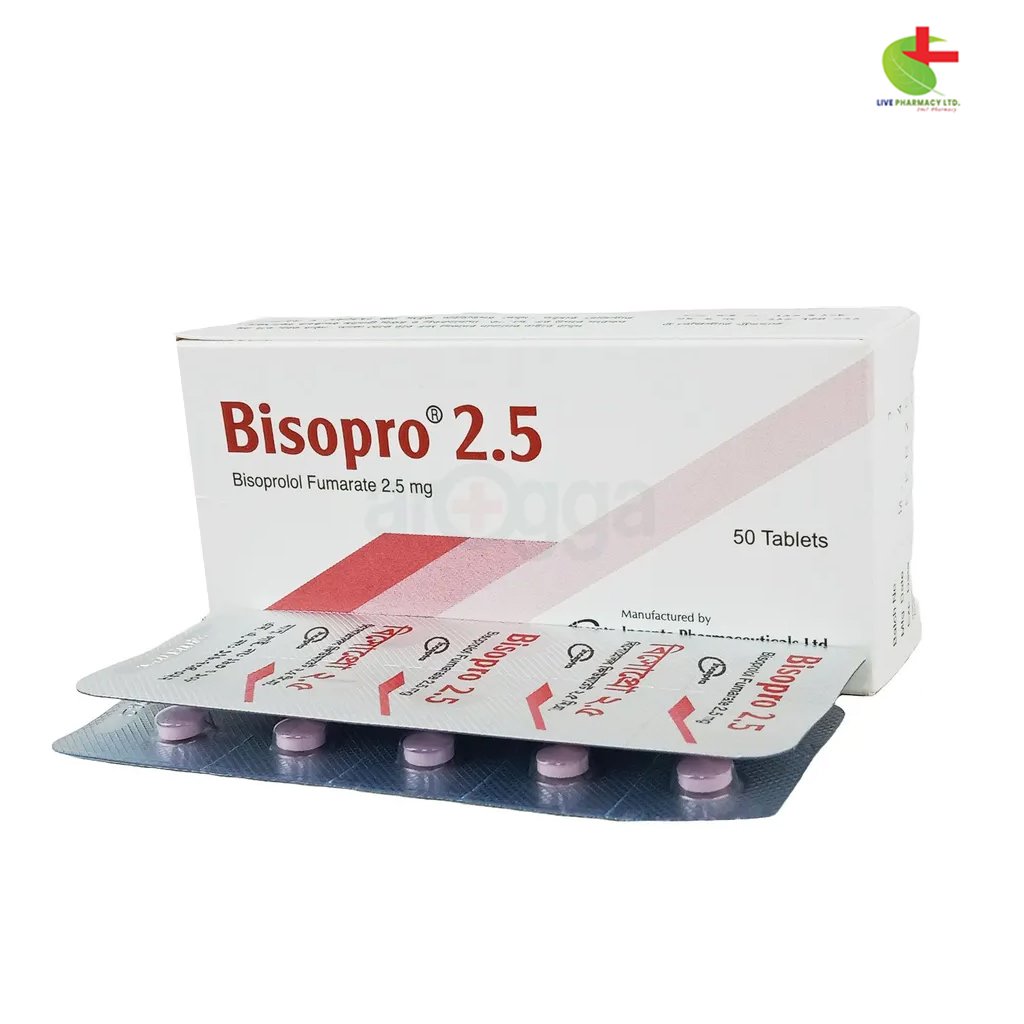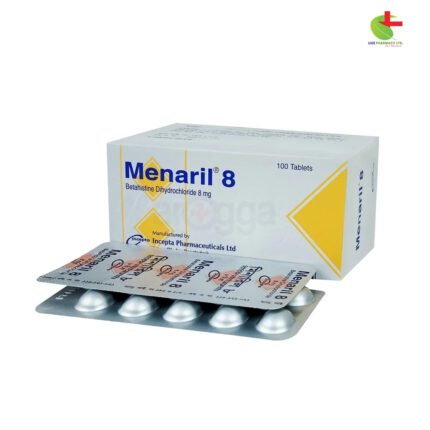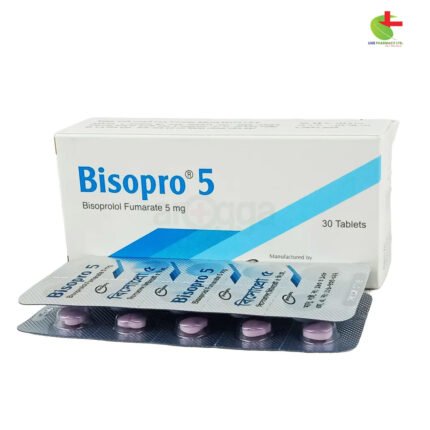Bisopro 2.5
60.00৳ Strip
- Bisopro is a selective beta-1 blocker indicated for managing hypertension, angina, and moderate to severe heart failure.
- It effectively reduces heart rate and cardiac output, lowering arterial pressure without adversely affecting lipid metabolism.
- With a pharmacokinetic profile that supports once-daily dosing, Bisopro offers reliable therapeutic benefits.
- Always consult a healthcare professional for proper usage and dosage.
 Brand
Brand
|
Incepta Pharmaceuticals Ltd |
|---|---|
 Generics
Generics
|
Bisoprolol Hemifumarate |
 Type
Type
|
Tablet |
Indications
Bisopro is prescribed for:
- Hypertension
- Angina
- Moderate to severe heart failure
Note: Bisopro is not suitable for emergency treatment of hypertensive crises.
Pharmacology
Bisoprolol Hemifumarate is the most selective beta-1 blocker available, exhibiting a high affinity for the beta-1 adrenergic receptor. It selectively inhibits these receptors in the heart and vascular smooth muscle, resulting in decreased heart rate and cardiac output, effectively lowering arterial hypertension. Unlike non-selective beta-blockers, Bisoprolol does not adversely impact lipid metabolism, maintaining levels of cardioprotective HDL cholesterol during long-term treatment.
The pharmacokinetic profile of Bisoprolol supports once-daily dosing, with minimal variability in plasma concentration.
Absorption and Bioavailability: Bisoprolol is over 90% absorbed from the gastrointestinal tract, achieving an absolute bioavailability of 88%. Food intake does not influence its absorption.
Metabolism: Metabolized primarily through oxidative pathways, Bisoprolol’s metabolites are polar and renally excreted, showing no pharmacological activity. It is mainly processed by CYP3A4, with a minor contribution from CYP2D6.
Elimination: Bisoprolol’s clearance is evenly divided between renal elimination and hepatic metabolism. Its half-life ranges from 10 to 12 hours.
Dosage & Administration
Adults: For mild to moderate hypertension, the starting dose is typically 5 mg once daily, either alone or in conjunction with a diuretic. Dosage may be increased to 10 mg or 20 mg as needed, with a 2-week interval between adjustments. Doses beyond 20 mg yield minimal additional benefits.
Children: Safety and effectiveness in those under 18 have not been established.
Renal or Hepatic Impairment: In patients with liver or kidney issues, start with 5 mg daily and exercise caution in titration due to potential accumulation.
Elderly: Generally, no dosage adjustment is needed unless there are significant renal or hepatic concerns.
Consult a registered physician before taking any medication.
Interaction
- Other Beta-Blockers: Bisopro should not be combined with other beta-blockers.
- Catecholamine-Depleting Drugs: Monitor closely if combined with drugs like reserpine or guanethidine.
- Centrally Active Antihypertensive Agents: May worsen rebound hypertension after clonidine withdrawal; adjust timing of beta-blocker introduction accordingly.
- Antiarrhythmic Agents and Calcium Channel Blockers: Use caution with drugs that depress myocardial function, as this may lead to severe bradycardia or hypotension.
Contraindications
Contraindicated in patients with cardiogenic shock, overt heart failure, advanced AV block, right ventricular failure due to pulmonary hypertension, and sinus bradycardia.
Side Effects
Potential side effects may include fatigue, dizziness, headaches, gastrointestinal disturbances (nausea, vomiting, diarrhea, constipation), cold extremities, muscle cramps, and respiratory issues in asthma or COPD patients.
Pregnancy & Lactation
- Pregnancy: Limited studies show no teratogenic effects in animals, but potential fetotoxicity exists. Use only if benefits outweigh risks.
- Lactation: Unknown if excreted in human milk; if necessary, consider discontinuing breastfeeding.
Precautions & Warnings
Caution is advised for patients with renal or hepatic impairment. Patients with severe allergies may react differently to epinephrine when on beta-blockers.
Therapeutic Class
Beta-adrenergic blocking agents (Beta-blockers).
Storage Conditions
Store in a cool, dry place away from light and heat. Keep out of reach of children.













Reviews
There are no reviews yet.